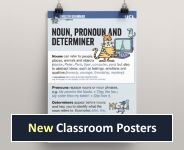Glossary: possessive
Explanation
A form of noun (with ' or 's added) or pronoun that is often used to show possession.
A possessive can be:
- a noun followed by an apostrophe, with or without s
- a possessive pronoun.
- Tariq’s book [Tariq has the book]
- The boys’ arrival [the boys arrive]
- That essay is mine. [I wrote the essay]
The relation expressed by a possessive goes well beyond ordinary ideas of ‘possession’. A possessive may act as a determiner.
- His obituary [the obituary is about him]
The meaning of a possessive is not always 'possession' in a literal sense, e.g. John's arrival.
See also possessive adjective.
Englicious contains many resources for English language in schools, but the vast majority of them require you to register and log in first. For more information, see What is Englicious?

